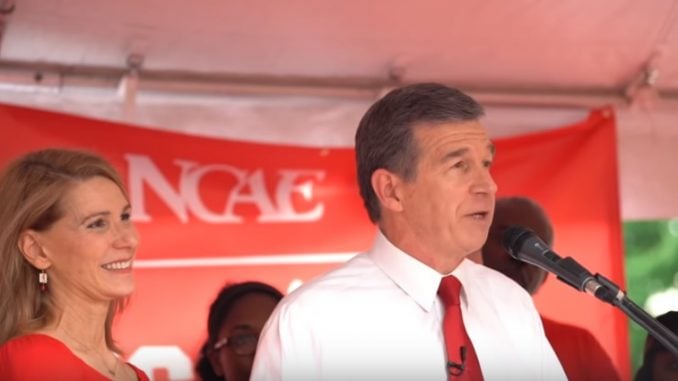
RALEIGH — Gov. Roy Cooper is telling North Carolina public school teachers his side of the story about why the extended state budget impasse means educators haven’t received meaningful raises this year.
Cooper’s office on Friday said it sent a letter to public school principals across the state with the request that it be forwarded to teachers and staff. The letter was dated Dec. 5 and was received by teachers across the state on Dec. 6.
In the letter, the Democratic governor urges educators to tell legislators to negotiate with him over a better pay plan for teachers and other school personnel. He said he offered a compromise in July and expressed willingness in October to work with Republican lawmakers on education pay separate from the budget.
“Unfortunately, you haven’t been afforded the respect you deserve in the legislative budget process,” Cooper wrote, adding: “I am doing my part. Now we need them to do theirs.”
Legislative leaders responded, calling the letter “inappropriate.”
“Governor Cooper is using his office and taxpayer resources to email our state’s education professionals regarding a political matter, using misleading information,” said House Rules Chair, Rep. David Lewis (R-Harnett). “The truth is, Governor Cooper has vetoed every teacher pay raise that’s been sent to him.”
“Teachers need raises, not political rhetoric from the NCAE and Governor Cooper,” said Lewis.
Lt. Gov. Dan Forest penned his own letter to teachers, saying “the governor has not provided a full picture of teacher pay raises and education spending in North Carolina.”
Forest’s letter also said the N.C. Association of Educators was blocking teacher pay raises and education funding for “partisan reasons” and asked teachers if the NCAE really is representing teacher interests.
“Does the NCAE really speak for all of you or would you rather like to have seen your 6th and 7th consecutive raises, school construction funds, school supplies and more school support funds released?” said Forest.
The deadlock began in June when Cooper vetoed the full two-year budget in part because he wanted average teacher pay at more than twice what the GOP budget offered. Republicans say Cooper is to blame for the impasse because he won’t let go of his Medicaid expansion demand. They also point to a standalone educator pay bill that Cooper vetoed last month as proof he isn’t serious about helping teachers.
In Cooper’s Dec. 6 letter, he claimed that he offered in October to “set aside” Medicaid expansion, which had been his primary budget demand.
Cooper’s original budget proposal was for a 9.1% raise over the biennium. The General Assembly’s budget, which he vetoed because it did not include Medicaid expansion, offered a 3.8% raise. For non-certified staff, Cooper’s original proposal was “$500 or 1.5%, whichever is greater.”
On July 9, Cooper’s compromise offer was an 8.5% raise for teachers over the next two years, a 5% non-instructional staff raise and a 2% cost of living adjustment for retirees. Medicaid expansion was also still one of the terms.
In the Oct. 24 press release, Cooper claimed to have “offered to negotiate teacher pay raises separately from the rest of the budget.” The release included a letter to legislators dated Oct. 18 in which Cooper said he was willing to discuss teacher pay “independent of other elements in the budget.”
Cooper’s Oct. 18 letter also said that a minibudget was “not an effective way to meet the state’s needs,” however, the governor had already signed multiple pay-related minibudgets.
On Nov. 1, the legislature sent a minibudget to Cooper with a teacher pay raise of 8.3% over the biennium. Teacher pay would be raised 3.9% in year one and an additional 4.4% in year two, contingent on Senate Democrats joining in an override of the governor’s budget veto.
The minibudget also included a 4% raise over the biennium for non-instructional support staff. UNC System/Community College employees would also see a 4% increase over the biennium.
Senate Democrats declined and the governor vetoed the bill, calling it “paltry.”
Cooper vetoed the 2017 and 2018 budget bills that contained teacher raises. The 2018 budget offered a raise of 9.9%. Republicans had large enough seat margins during those years to override the vetoes. But they no longer have veto-proof majorities.
“Gov. Cooper speaks of respecting teachers but blocking much needed raises doesn’t demonstrate much gratitude for their hard work,” Republican Sen. Deanna Ballard of Watauga County, an education budget-writer, said in a release.
“My momma taught me: ‘Watch what a man does, and not necessarily what he says,’” said Ballard. “Three times over the past three years Republicans have sent teacher pay raises to the Governor – three times he vetoed them.”
The legislature reconvenes in mid-January.
The Associated Press contributed to this report.


